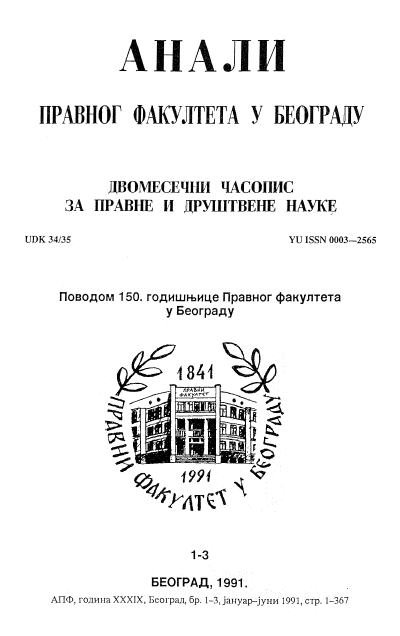ЗАТВОР У АТИНСКОМ ПРАВУ И ИСЕЈЕВО ’KATOIKODOMEIN
IMPRISONMENT IN ATHENIAN LAW AND ISAEUS' KATOIKODOMEÎN
Author(s): Sima AvramovićSubject(s): History of Law
Published by: Правни факултет Универзитета у Београду
Keywords: Classical Greek law; Imprisonment; Isaeus
Summary/Abstract: The author tries to find out the real meaning od the term katoikodomeîn in the speech of Athenian author of judicial speeches Isaeus, VIII41. This word is usually interpreted by translators as .imprisonment" and the like. The use of this word is analyzed at Pseudo-Xe- nophont, Aristotle and Strabon and the conclusion follows that its basic meaning - „build up", „construct" in the above context does not amount to an understandable meaning. The author therefor considers that the term katoikodomeîn at this point has a specific juridical meaning. He challenges Wyse's assumption that the captive was under a duty to take part in the army or to pay his debt to the state, and that he was disfranchised because of his failing to appear at the appointed time. On the ground of logical-rethorical and tactical structure of the speech, procedural position of the parties, connection between the notions katoikodomeîn and epiboulein, the analysis of the indictment graphe hybreos - which was lodged in this case, as well as of comparative law arguments (especially the institute of ličenje, namely deprivation of one's fights and exclusion in customary law of Albanians), the author submits that katoikodomeîn was a kind of self-isolation within the house, where the person loosing the good name retreats. Independently of the degree of acceptability of this hypothesis, the author emphasizes that in any case this word does not signify the imprisonment - in the classical sense, so that translations interpreting in such a way this term are not adequate.
Journal: Анали Правног факултета у Београду
- Issue Year: 39/1991
- Issue No: 1-3
- Page Range: 10-18
- Page Count: 9
- Language: Serbian

